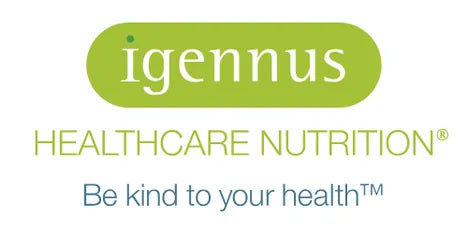That eagerly anticipated ‘tick’ of the clock into New Year can often turn out to be bittersweet, leaving last year behind and with intentions for the year ahead, only to be left with low energy, run down and struggling to feel motivated about anything. Oh, and don’t forget the bloated feeling and tired-looking skin after the over-indulgence of the festive period. Pledges of a ‘dry January’, Veganuary or whatever the latest health craze is, get put on hold until all of the festive indulgences have been consumed because, actually, it’s been a really stressful month and all you want is a big meaty or carb-laden meal washed down with your favourite tipple, which only leaves you feeling like you have failed in your intentions before you’ve even begun. We’ve all been there and that is why, at Igennus, we believe life is all about balance. If you deprive yourself of the things you enjoy the most, you really are setting yourself up to fail because, of course, you are going to feel tempted, and then punished for not being able to have the things you enjoy the most; we feel that if you look after your health 80-90% of the time, shouldn’t you be able to enjoy your favourite indulgences (although without overdoing it) the rest? It’s simply a matter of balance.
Why does the festive season leave us feeling so rotten?
Attaining ultimate health is not as simple as a quick diet; it can take a long time to combat the years of unhealthy habits that have formed and no amount of herbal tea or quick-fix detox diet is going to counteract it. If you are looking for a New Year health reset that will leave you feeling refreshed all year long…..keep reading, as we are going to make this much easier for you in this 3-part special from nutritional therapist Maxine Sheils.
The festive period is arguably the most ‘indulgent’ time of year, with Christmas parties and an abundance of festive foods, meaning diets, alcohol intake, sleep and stress levels can all be negatively affected, leaving a feeling of low mood, poor motivation, bad skin, headaches and that general run down feeling that often means you end the festive season with a cold or worse. Added to that, the supermarkets appear to be stocking up with Christmas goodies earlier and earlier each year, prolonging those festive indulgences (or starting them earlier). Putting some healthy habits into place now will help you make better choices when, dare I say it, Christmas comes around again at the end of the year.
Your health reset
There is no secret to a ‘detox’, the body is constantly detoxifying chemicals, hormones, foods and toxins using the liver, kidneys, skin and bowels. To support the body in this natural process, we need to ensure that we are enabling the elimination of the toxins that the body is working hard to flush out.
Hydrate your health
The human body is around 60% water, which can be found both in and around all the cells of the body, and also in blood. Water is required for numerous functions: it supports the production of digestive fluids which help to break down the food you eat into vitamins and minerals; it supports the removal of waste from the body as sweat, urine or faeces; most importantly, it supports the delivery of oxygen to the cells of the body, vital for every single act the body must perform. Is it any surprise, then, that when you aren’t consuming enough water, the bowels can become sluggish, with symptoms such as constipation (counterintuitively, watery diarrhoea can also be a symptom of constipation), low energy, headaches and dry skin? Your body may simply be crying out for hydration. Unfortunately, fluids are not equal in their ability to hydrate. Caffeinated drinks, such as tea and coffee, can have a diuretic effect, meaning that they can actually promote the excretion of water in the body rather than help support hydration levels. If you are relying solely on tea and coffee as sources of fluids, then you really ought to consider a glass of water – right now! Similarly, fizzy drinks and alcohol can have the same diuretic effect, therefore not supporting hydration as well as water.
To ensure optimal hydration, not only do you need to ensure you are drinking plenty of water, but consider reducing your intake of caffeinated drinks, alcohol and fizzy drinks, none of which will support hydration. Notice here that I am not saying to avoid them completely – simply be wise about it. If you enjoy a cup of coffee first thing in the morning, try to have a glass of water before and after. If you are sharing a bottle of wine over a meal with friends or family, ensure there is a bottle of water on the table too (for drinking, not decorative purposes), and make every other sip water.
Starting your day with a large glass of water on rising is a great way to replenish lost fluids from sweating during the night. There are many water bottles available to buy too, making it easy to carry water with you in case you become thirsty on the go; if you have it with you, you have no reason not to drink it. If you don’t enjoy drinking water on its own, it’s time to get creative by adding a few slices of fruit, a handful of berries, or even some herbs. Spa-inspired cucumber and mint water, anyone? If you are still struggling, consider water drops such as these from SweetLeaf to provide a tasty fruit flavour to your water.
The amount of water you need differs from person to person so to help you get the balance right (you can drink too much), look no further than your urine, which should be a pale yellow colour. Any clearer and you are over-hydrating, any darker and you need to increase your intake. Trust me – your body, skin and energy levels will thank you for this one simple change.
Clear out the waste
This is not about asking you to throw out all the leftover Christmas chocolates (leftover chocolates?); we’re focusing on the waste from the body. Whilst hydration is key, it is not the only component which will help to move waste out of the body. Unfortunately, you can have the healthiest of diets, abundant in the necessary nutrients to support the liver, but if the toxins are being reabsorbed in the gut because you aren’t passing a stool at least daily, you need to accept that some changes are necessary.
Fibre is important in supporting the production of well-formed and easy to pass stools, important considerations for clearance of waste and toxins from the body. There are two types of fibre that are important to the formation of healthy stools – soluble and insoluble fibre. Soluble fibre helps to soften stools, whilst insoluble fibre promotes bowel movements. You can obtain both soluble and insoluble fibre from eating fruit and vegetables, wholegrains, nuts and seeds, giving another reason to aim for your 7-a-day (5 vegetables and 2 fruits). 7-a-day seem too ‘extreme’? Not everyone loves vegetables so here are some simple ways to increase your intake:
- Make tomato-based meals such as curry, stew, pasta sauce or soup, with added onions, garlic, peppers and mushrooms
- Add extra salad to your midday sandwich or wrap
- Throw some frozen peas into a home-cooked cottage pie
- Snack on carrot sticks with hummus, celery with peanut butter, or an oat cake with cheese, tomatoes and cucumber
- Serve evening meals with a side of 2 vegetables. Try homemade salsa, cabbage slaw, or some green beans with tomato and feta
- Feeling adventurous? Swap white rice for homemade broccoli rice, pasta for spiralised courgette, or your pizza base for a cauliflower base
You should be aiming to pass at least one stool every day that is both well-formed and easy to pass. Don’t expect dramatic change in your bowel habits overnight; if your diet has been lacking in fibre, fruit and vegetables, it may take a while to start increasing your intake. Magnesium is a great nutrient for supporting symptoms of constipation as it is needed by the muscles of the bowels to support contractions in the gut; consider Triple Magnesium Complex. Conversely, if your stools are loose and you are passing a stool more than three times per day, you may want to consider these tips from nutritional therapist, Catherine Jeans.
Sweat it out
Sweating is another great way to clear out toxins from the body but fear not, a rigorous workout at the gym is not your only option. The gym is not for everyone, and for many different reasons; the amount of mirrors, the lack of knowledge about what to do once you’re there, the lack of motivation to workout, the expense, the time restrictions, or simply the lack of enjoyment in working out. Whatever the reason, when encouraged to sweat, you don’t need to set unrealistic expectations for yourself such as being in the gym at the crack of dawn, and being so fit that you are able to run a marathon at the drop of a hat. A New Year is always a good time to have a clearout of unwanted or unnecessary things, so concentrate on working up a sweat by clearing out the attic, pulling the beds out to clean the areas often missed, clean the windows, get out and clear up the leaves on the drive, whatever needs to be done to help get the heart racing and have you perspiring. No housework? No problem! Put on your favourite ‘feel-good’ music and have a dance around the house for 30 minutes. Need to pick up a few bits from the shop? Why not walk there and back, benefitting from the added weight on the way home. Those simple tricks like taking the stairs rather than the lift or getting off the bus one stop earlier and walking the rest of the way, are all you need to get the body moving and encourage toxin elimination. Not only that, movement supports the production of those feel-good endorphins – say goodbye to the January blues.
The trick here is to start small and build up. Start with a ten-minute walk on your lunchbreak, build it up to a 30-minute walk, increase the pace, add some weight, try a little incline, make it a slow jog, join your local Park Run for a Saturday morning 5k run in your local park. Too far? Running isn’t for everyone so find what works best for you and set yourself small goals to help you keep building on your capabilities.
Whilst exercise has multiple benefits for overall health and wellbeing, it is not the only way to build up a sweat. Why not consider a gym with a steam room or sauna to help encourage the elimination of toxins via the skin. Even a hot shower or bath will encourage the pores of the skin to open.
As you will see, making some small changes to your diet and lifestyle is really all you need to support the elimination of toxins without signing up to any special diets. In part 2 of the series, nutritional therapist Maxine Sheils takes you a step further with simple tools to support the health of the gut, as well as practical tips on how to reduce the burden you unknowingly place on your body every day.








